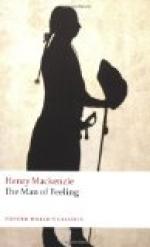In passing through Piccadilly, he had observed, on the window of an inn, a notification of the departure of a stage-coach for a place in his road homewards; in the way back to his lodgings, he took a seat in it for his return.
CHAPTER XXXIII—HE LEAVES LONDON—CHARACTERS IN A STAGE-COACH
The company in the stage-coach consisted of a grocer and his wife, who were going to pay a visit to some of their country friends; a young officer, who took this way of marching to quarters; a middle-aged gentlewoman, who had been hired as housekeeper to some family in the country; and an elderly, well-looking man, with a remarkable old-fashioned periwig.
Harley, upon entering, discovered but one vacant seat, next the grocer’s wife, which, from his natural shyness of temper, he made no scruple to occupy, however aware that riding backwards always disagreed with him.
Though his inclination to physiognomy had met with some rubs in the metropolis, he had not yet lost his attachment to that science. He set himself, therefore, to examine, as usual, the countenances of his companions. Here, indeed, he was not long in doubt as to the preference; for besides that the elderly gentleman, who sat opposite to him, had features by nature more expressive of good dispositions, there was something in that periwig we mentioned, peculiarly attractive of Harley’s regard.
He had not been long employed in these speculations, when he found himself attacked with that faintish sickness, which was the natural consequence of his situation in the coach. The paleness of his countenance was first observed by the housekeeper, who immediately made offer of her smelling bottle, which Harley, however, declined, telling at the same time the cause of his uneasiness. The gentleman, on the opposite side of the coach, now first turned his eye from the side direction in which it had been fixed, and begged Harley to exchange places with him, expressing his regret that he had not made the proposal before. Harley thanked him, and, upon being assured that both seats were alike to him, was about to accept of his offer, when the young gentleman of the sword, putting on an arch look, laid hold of the other’s arm. “So, my old boy,”




